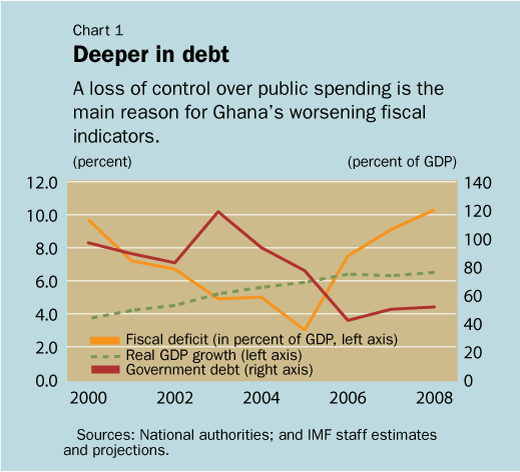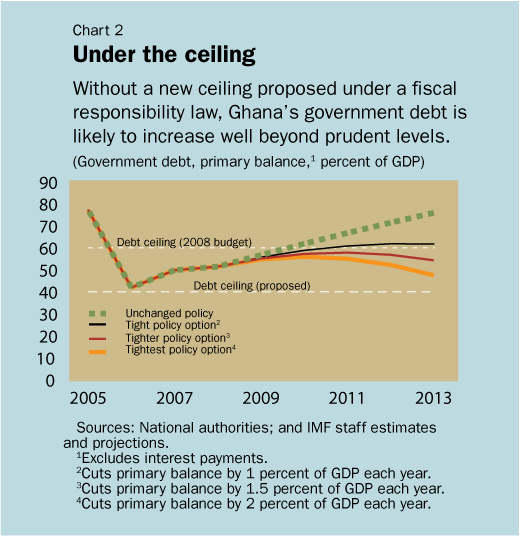
Typical street scene in Santa Ana, El Salvador. (Photo: iStock)
IMF Survey: Ghana Aims for Firmer Fiscal Discipline Before Oil Flows
July 31, 2008
- If viable oil, gas deposits are confirmed, Ghana set for significant revenues
- Fiscal indicators have worsened and corrective action is urgently required
- Government proposing introduction of fiscal responsibility law
Ghana's authorities are contemplating far-reaching reforms designed to further strengthen fiscal discipline and transparency and make effective use of prospective oil and gas revenues.

Gas platform off coast of West Africa: Ghana could soon benefit from significant oil, gas revenues that will need prudent management (photo: Newscom)
TECHNICAL ASSISTANCE IN AFRICA
As Ghana is entering a new phase of development and is in transition to become what is sometimes called a "frontier" emerging market economy, new priorities have to be addressed. The IMF is helping the country deal with its rapidly changing needs.
Ghana has made impressive economic progress in recent years, with high and sustained growth. Nevertheless, fiscal indicators have worsened sharply. The fiscal deficit, including grants of about 5 percent of GDP, rose to just below 10 percent of GDP in 2007 and is projected to increase further in 2008. Government debt is also on the rise again despite the recent debt relief that helped reduce the debt burden from 77 percent of GDP in 2005 to below 40 percent of GDP in mid-2006 (see Chart 1).

Corrective measures are urgently required. A loss of control over public expenditure—in particular, subsidies to the state-owned electricity company, and a rapidly rising wage bill—are primary reasons for this deteriorating fiscal performance.
New developments
In addition, two important developments are likely to increase fiscal instability over the next few years. First, the authorities are proceeding with a fiscal decentralization strategy that will transfer many functions from central government to local governments in core areas such as education and health, and substantially increase their borrowing powers.
Second, if the deposits are confirmed as commercially viable, Ghana will benefit from significant oil and gas resources that will generate revenues that are expected to rise from 3 percent of non-oil GDP starting in 2011 to around 5 percent of non-oil GDP from 2013 onward. However, these resources will need to be managed prudently if their economic potential is to be realized, and good use made of the resulting revenues.

Tax poster in Accra, Ghana: the country has made impressive economic progress in recent years, but its fiscal indicators have worsened sharply (IMF photo)
Since the Ghana's last IMF-supported program expired in 2006, the Fund has maintained a close policy dialogue with the authorities, including through bilateral surveillance missions conducted by country specialists and through technical assistance missions staffed by experts in specific economic areas. IMF monetary and capital markets staff recently sent a mission to help the authorities strengthen the debt management strategy. Statistics experts have conducted several missions to help improve economic and financial data. Fiscal specialists have been helping Ghana improve public financial management, including through resident experts.
The authorities are currently designing a policy framework that would better anchor economic policy, especially monetary and fiscal policy, through an inflation targeting mechanism and a fiscal responsibility law (FRL). Building on the work of the IMF's country specialists, the Fund's fiscal experts have been advising the authorities on the measures they might take to address existing and new fiscal priorities.
Fiscal Responsibility Law
Finance Minister Kwadwo Baah-Wiredu announced in his 2008 budget that the government would introduce an FRL, based on the experience of implementing such laws in other countries. An FRL would ensure that the government's medium-term fiscal framework (MTFF) is open to public scrutiny (e.g., by publishing an annual fiscal strategy report); that comprehensive fiscal information on central and local governments, decentralized agencies and state-owned enterprises are made available; that reporting and financial oversight arrangements are strengthened; and that appropriate enforcement mechanisms are put in place to deal with cases where public funds are misused or misappropriated.
As part of the MTFF, the law might include a numerical fiscal rule in the form of a debt ceiling (under current circumstances, a prudent level of debt might be 45 percent of GDP). Without such a fiscal anchor, debt is likely to increase well beyond prudent levels. As shown in Chart 2, the rule could stipulate that the primary balance improve by a minimum amount of between 1 and 2 percent of GDP, whenever debt is above the ceiling. The primary balance is specified because it excludes interest payments, which are not entirely under government control.

Oil and gas revenues
The government has set up a wide-ranging review of policy issues related to the development of the oil and gas sector, including the fiscal regime. One option is to establish an oil and gas revenue fund. Resources from this fund could play an important role in financing the non-oil deficit, saving resources for future generations, and helping maintain macroeconomic stability.
Good international practice suggests that a revenue fund should be a separate account under the control of the Treasury; that clear rules be established for transferring oil revenues into the account and making transfers to the budget to finance the non-oil deficit; that the fund be regulated by an investment strategy supervised by a professionally staffed investment committee; and that arrangements for regular reporting and independent audit of the management and use of oil and gas resources be put in place.
A review of the fiscal regime for gold—where government revenues have been modest, despite buoyant export earnings, as a result of generous writeoff provisions and other tax breaks for gold producers—is also under way.
Public financial management
While Ghana has been actively pursuing public financial management (PFM) reforms for many years, weaknesses persist in key areas such as the medium-term expenditure framework, the computerized financial management information system—which remains in its pilot phase 8 years after its initial launch—and the integrated personnel and payroll management system.
Dealing with these issues in a timely way will be critical to the successful implementation of an FRL and the fiscal consolidation process. The IMF's fiscal experts have recommended that management systems be given priority in the government's medium-term action plan for PFM reform.
Because sound PFM and management of natural resources wealth are an essential underpinning of good governance and effective and efficient use of domestic and aid resources in many countries, the IMF is exploring interest in establishing multi-donor trust funds in these areas to galvanize support for its TA to Ghana and other countries.
Comments on this article should be sent to imfsurvey@imf.org.


